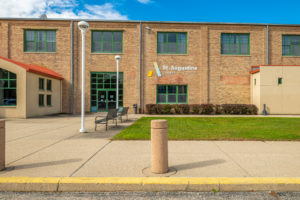Positive Impact of a College-Level Bilingual Language Program
11/20/23
With the opportunity to both get a higher education degree and develop your skills in both your native and English language, there is a big reason that bilingual language programs have benefits you don’t want to miss out on.
What is a Transitional Bilingual Program?
Offering students the opportunity to speak both their home language and English in a non-ESL environment is a more intuitive way to help eager ESL students master that language. This is done through a variety of methods, most importantly is an adjustment in how much of the course is conducted in their home language, and how much is conducted in English. At the start of a transitional bilingual education, a student might be learning 80% of their education in their home language, and the other 20% in English. But over time, the hope is that as a student becomes more comfortable with English, the program turns to 50/50, and eventually, the English as a second language learner is comfortable enough to have the majority of their courses conducted in English.
The Benefits of Speaking Fluent English in Your Profession
Bilingual classes not only help you master English, but they also help you secure specific knowledge in a potential future career where you need to have in-depth knowledge and vocabulary, such as in the field of respiratory therapy or social work, each of which requires a comprehensive knowledge of their intricacies, but they are well rewarding and in high demand.
There are a wide variety of neurological reasons that having a bilingual education can help you as well. Neuroscience research has shown that studying a second language can increase brain density and cognitive skills, and help prevent Alzheimer’s disease and other cognitive impairments. With these skills, you can pay better attention during work and at school, along with boosting your competence when it comes to problem-solving, a crucial life skill that can help you go far in life.
Not only will a transitional bilingual program help you become more independent and competent in English, but it can also help you have a deeper understanding of your home language. By acquiring those basic building blocks of language learning in a new language, you remember how and why you form sentences in your native tongue, and the result is a deeper ability to speak publicly and professionally in either language.
There is also evidence that a bilingual language program benefit can include on average higher academic achievements across the board from math to reading comprehension.
What College Can You Go to as a Working Adult and Get Your Degree?
At St. Augustine College, our transitional bilingual education is designed for both students fresh out of high school and nontraditional students who are working full-time jobs. The goal is to help students unlock their full potential, by having small classes that can be taken online or in person, and an accommodating faculty who are there to help students succeed, a student can learn English over the course of their program, while at the same time acquiring a degree that can either help them build a career outside of the classroom, or be used as a stepping stone to either a bachelors degree or graduate school. If you are curious about why St. Augustine College, a Hispanic-serving institution, can benefit you and your family, learn more here.





